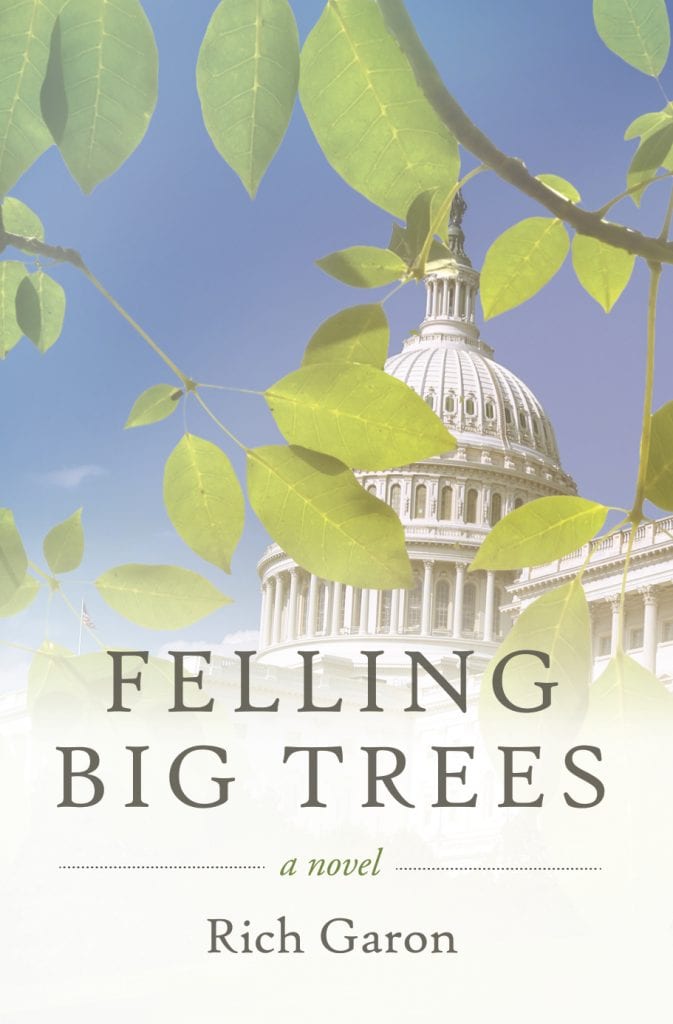Who better to translate the DC roller coaster into a great political fiction than someone who has spent decades enmeshed in the gridlock of the country’s capital?
Rich Garon is just the guy.
In the eighties and nineties, Garon worked as chief-of-staff of the US House Committee on International Relations. When he retired, he began writing books to capture the stress and struggle of policy work, but also the incredible good deeds that can come it.
Clearly his life’s earlier work affected his writing — from the character development of his stories to the fact that he’s donating all the proceeds of his debut novel, “Felling Big Trees,” to WhyHunger?, a non-profit organization that works to fight hunger and poverty across the globe.
“Felling Big Trees” is set in the 1990s and follows a disgraced and widowed congressman who seeks redemption in America’s heartland. Small-town anonymity intrigues him as he recovers from political disaster and tries to free himself — and his teenage daughter — from the grips of his politically powerful mother in law.
A story of romance, power and second chances, “Felling Big Trees” proves that compassion and tolerance are not only possible in a time of strident tone, but essential for survival.
Below, Garon answers 10 questions about his work and writing style. Purchase the book here, and continue following the “Felling Big Trees” blog tour tomorrow over at A Sky Filled With Sparkling Stars.
Did your work as a chief-of- staff for the US House Committee on International Relations influence your work on Felling Big Trees? How so?
Yes, it did. In that position, I had the opportunity to be involved in policy-making on some of the critical issues of the day, such as arms control, human rights, and development assistance issues. Working on Capitol Hill for more than 25 years also gave me first-hand knowledge about how things worked, and an insight into the personal lives of members of Congress, such as how they juggled family with the demands of the job.
What inspired you to write Felling Big Trees?
I believed some of the things I referred to above were worth sharing. I had just retired from my position on Capitol Hill and I thought I could bring an authenticity to things I wrote about in a novel. Themes in the book, such as helping those with few resources and stepping out from apathy when large problems demand action, were themes I wanted to share.
How did you marry compassion and tolerance with a story that also has intrigue and pace?
I believe the essence of a good policy-maker is compassion — a concern for those who need help. I tried to develop characters whose actions could show the importance of compassion against a backdrop of forces that challenged and threatened these individuals. Felling Big Trees is also a romance novel, showing how two individuals develop a relationship of love and hope. It also showcases the importance of father-daughter relationships.
Why use writing as a tool to support ending hunger?
I’ve learned it is important to use as many platforms as possible to make people better aware of some of the larger problems facing our society. From that awareness can come a political will to work with others to develop policies to help end these problems. I first worked with WhyHunger over 40 years ago when it first started bringing attention to the hunger issue. It is a great organization that has been tirelessly working to reduce hunger and poverty. Accordingly, I decided to donate proceeds from the sale of this book to WhyHunger.
What is the biggest misconception about homelessness or hunger in America?
I don’t believe the scope of either problem is well known. While we have made some advances in the past, there are far too many who suffer from homelessness and hunger.

When and where do you write? Have you found you work better on a schedule or did you write when you felt motivated?
I write at home and prefer to start in the early morning. In my case, I’ve found that I have to write every day, usually till mid-day. There are other times when a great idea occurs or when I’ve realized something I’ve written just doesn’t work. I’ll jot down some notes and work on it when I’m back at the computer.
While working on this book, did you ever experience writer’s block or become stalled in your writing? If so, when and how did you push through it?
Yes, more than once. There are so many things involved in a novel of close to 300 pages. Characters, scenes, plots, so many things must tie together. Sometimes you can make quick-fixes. However, you’re often faced with major rewrites that you just have to accept and develop.
Do you have any tips for writers on how they can channel their life experience into their storytelling?
I found it’s the little things that make for compelling stories. Some small things you can remember about a person or place that are described well can make for a good read.
Will you write another novel?
I have three completed manuscripts (one’s a children’s book) and I hope to have them published.
If you could invite three people, living or dead, to a dinner party. Who would you invite and why?
C.S. Lewis, Graham Greene, and Jesus. The first two are my favorite authors; their writing skill and intellect never cease to amaze me. Jesus has also had a profound impact on their lives and on mine as well.
